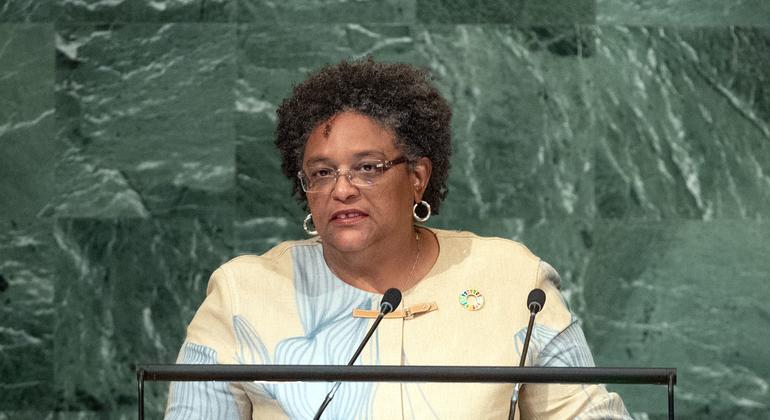Barbados PM Mottley’s Gung-Ho Mission to Revamp Unfair Global Money Game
 Mia Amor Mottley, the Prime Minister of Barbados, urged world leaders to “use the power of the pen” and impose natural disaster and pandemic clauses in developing countries’ debt, as well as remove the current barriers to accessing financial assistance from multilateral development banks.
Mia Amor Mottley, the Prime Minister of Barbados, urged world leaders to “use the power of the pen” and impose natural disaster and pandemic clauses in developing countries’ debt, as well as remove the current barriers to accessing financial assistance from multilateral development banks.
During her speech, Ms. Mottley spoke extensively about the need to reform the ageing global financial architecture to better reflect today’s realities, for instance making it easier for climate-stricken countries to access capital.
Indeed, the Bretton Woods Agreement that gave rise to the World Bank and the International Monetary Fund (IMF) “no longer serve the purpose in the 21st century that they served in the 20th century,” she said.
She called for a global compact establishing that financing for development cannot be short term, but instead should be at least a 30-year loan.
“The world recognized this when allowed Britain to participate in the refinance of its World War I bonds which were only paid eight years ago, 100 years after World War I started,” she said by an example.
She also argued that Germany was allowed to cap its debt payments at the equivalent of 5 per cent of its exports, under the premise that the “cataclysm” experience of a war would not allow them to finance reconstruction while repaying debts incurred during the war.
“We are no different, we have incurred debts for COVID-19, for climate, and now to fight this difficult moment of the inflation and [supply crisis]. Why [must the] developing world find money in 7 to 10 years when others had the benefit of longer terms to repay their [loans]?”, she asked the General Assembly.
Loss and damage
Ms. Mottley also referred to the issue of loss and damage and praised Denmark for becoming the first central Government in a developed country to propose a fund devoted to this purpose, which in practical terms would directly help nations at the frontline of climate crisis.
“Any attempt to deny that the climate crisis has man-made origins is an attempt to delude ourselves and to admit that we want to be accomplices in the continuing death and loss of damage that ensues to the people who are the victims of it”, she said.
The Prime Minister asked countries to take responsibility because otherwise, the world is not going to see any change.
“The commitments of loss and damage are absolutely critical if we are to make serious progress in saving our world… the trust that is needed to propel us to fight the great causes of our time will not be won by breaching promises,” she said.
She also highlighted that while small States like Barbados have made net zero commitments, the current state of global affairs, including Atlantic hurricanes, the war in Ukraine, and the absence of financing, does not allow them to stop accessing their natural gas resources right now.
UN Reform and fairness
The Barbados leader also referred to the United States President’s words earlier this week and supported a reform of the Security Council.
“We call an echo for that, but we go further. We believe that a Security Council that retains the power of veto in the hands of a few, will still lead us to war as we have seen this year, and therefore the reform cannot simply be in its composition but also [must include] the removal of that veto,” she said.
Ms. Mottley also called for the reform of the G20 and G7 groups, arguing that Barbados “cannot accept” these “informal committees of governance” when they have no African-descent representation and exclude 1.5 billion people in the world.
“How could it be expected to reflect fairness and transparency in its decision making?”, she underscored.
She argued that to be able to move from “possibilities” to “realities” it is essential to embrace a transparency framework that would allow the people who are losing faith in institutions that fairness does mean something.
“Fairness and togetherness are needed to bring about peace, love and prosperity in this world. And this is not romanticism these are hard realities that simply require decisions,” she explained.
Speak the truth
Finally, the Prime Minister said that world leaders must have mature conversations and speak to their people instead of relying on headlines and soundbites, to avoid a disconnect between the government and the governed.
“With those commitments, we can make a difference in this world and let us do so recognizing that a world that reflects an imperialistic order, hypocrisy and lack of transparency will not achieve that mission, but one that gives us freedom transparency and levelled playing field will allow for a difference,” she concluded.
🇧🇧 Barbados – Prime Minister Addresses United Nations General Debate, 77th Session (English) | #UNGA
Elliot is an award-winning journalist passionate about international affairs and humanitarian causes. Elliot has covered stories from conflict zones and areas devastated by disasters, highlighting critical global issues.




Ms. Mottley’s proposal is essential in addressing the outdated global financial system. It’s time for world leaders to take action and reform the current structures to better support vulnerable countries in times of crisis.
During her speech, Ms. Mottley spoke extensively about the need to reform the aging global financial architecture to better reflect today’s realities, for instance making it easier for climate-stricken countries to access capital. Indeed, the Bretton Woods Agreement that gave rise to the World Bank and the International Monetary Fund (IMF) “no longer serve the purpose in the 21st century that they served in the 20th century,” she said. She called for a global compact establishing that financing for development cannot be short term but instead should be at least a 30-year loan. “The world recognized this when allowed Britain to participate in the refinance of its World War I bonds which were only paid eight years ago, 100 years after World War I started,” she said by an example. She also argued that Germany was allowed to cap its debt payments at the equivalent of 5 per cent of its exports under the premise that the “cataclysms
Do you think Mia Amor Mottley’s proposals have the potential to significantly change the global financial landscape?
Ms. Mottley’s proposals are indeed ambitious and could potentially bring about a much-needed shift in the global financial landscape. The call for reforming the outdated global financial architecture and advocating for longer-term loans in development financing are crucial steps towards ensuring fair and sustainable financial practices on a global scale.
Is Mia Amor Mottley’s proposed 30-year loan strategy realistic for developing countries struggling with debt? How can global leaders ensure the implementation of natural disaster and pandemic clauses in debt agreements?
EmilySmith, Mia Amor Mottley’s vision of a 30-year loan strategy for developing countries is indeed ambitious but not impossible. By extending the loan period, it can provide more breathing room for these countries to manage their debt sustainably. To ensure the implementation of natural disaster and pandemic clauses, global leaders must prioritize policy changes and enforce accountability mechanisms within debt agreements.
Do you think implementing natural disaster and pandemic clauses in developing countries’ debt is a feasible solution to tackle the current global financial challenges?
EmilySmith123, I believe that implementing natural disaster and pandemic clauses in developing countries’ debt could be a step in the right direction to address the current global financial challenges. By including such clauses, countries facing unexpected crises would have a structured mechanism in place to negotiate their debt obligations during times of emergencies, potentially easing their financial burden and encouraging more sustainable recovery efforts.
During her speech, Mia Amor Mottley spoke extensively about the need to reform the ageing global financial architecture to better reflect today’s realities, for instance making it easier for climate-stricken countries to access capital. Indeed, the Bretton Woods Agreement that gave rise to the World Bank and the International Monetary Fund (IMF) “no longer serves the purpose in the 21st century that it served in the 20th century,” she said. She calls for a global compact establishing that financing for development cannot be short term, but instead should be at least a 30-year loan. “The world recognized this when allowed Britain to participate in the refinance of its World War I bonds which were only paid eight years ago, 100 years after World War I started,” she said by an example. She also argues that Germany was allowed to cap its debt payments at the equivalent of 5 per cent of its exports, under the premise that the “cataclysmic”
Ms. Mottley’s stance on restructuring the global financial system is commendable. It is crucial that world leaders take proactive measures to address the disparities in access to financial support for developing nations, especially in times of crises like natural disasters and pandemics. The proposed 30-year loan for development financing and the call for a more inclusive approach to debt management reflect a forward-thinking vision that is much needed in today’s world.
During my speech, I spoke extensively about the need to reform the ageing global financial architecture to better reflect today’s realities, for instance making it easier for climate-stricken countries to access capital. Indeed, the Bretton Woods Agreement that gave rise to the World Bank and the International Monetary Fund (IMF) “no longer serves the purpose in the 21st century that it served in the 20th century,” I said. I call for a global compact establishing that financing for development cannot be short-term, but instead should be at least a 30-year loan. “The world recognized this when allowed Britain to participate in the refinance of its World War I bonds which were only paid eight years ago, 100 years after World War I started,” I said by way of an example. I also argue that Germany was allowed to cap its debt payments at the equivalent of 5 per cent of its exports, under the premise that the “cataclysmic events that occurred at the beginning of the century, World War One, were not of its own making, but the making of many,” I explained.
Do you think global leaders will implement Mia Amor Mottley’s proposed changes efficiently and swiftly?
It remains to be seen whether global leaders will swiftly and efficiently implement Mia Amor Mottley’s proposed changes. The complexities of international finance and politics often slow down such reforms, but Mottley’s passionate advocacy may lead to positive advancements in reshaping the global money game.